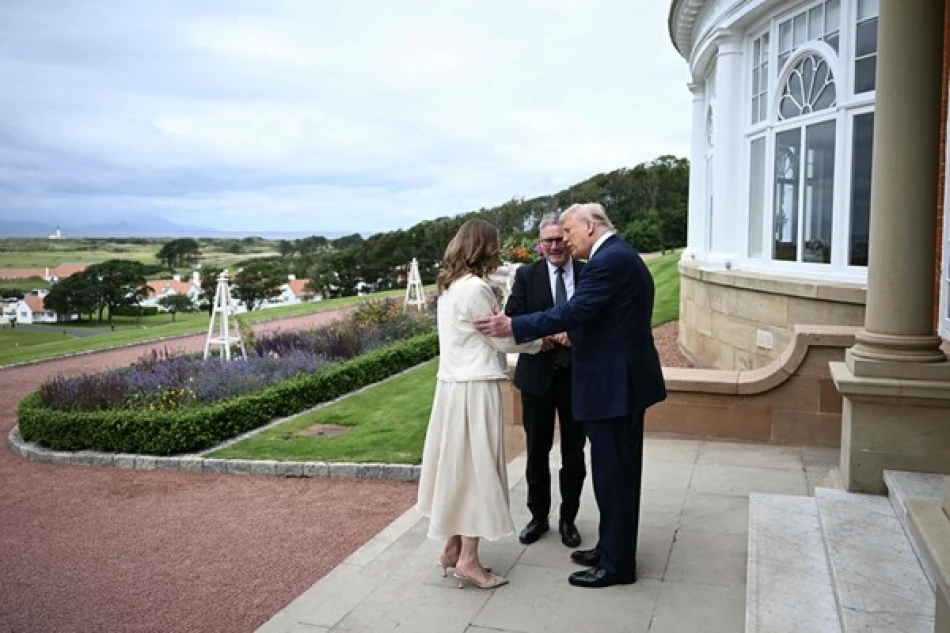
British PM Meets Trump in Scotland for High-Stakes Talks
Trump and Starmer's Golf Course Diplomacy: Gaza Takes Center Stage as Trade Tensions Ease
British Prime Minister Keir Starmer will meet US President Donald Trump at a luxury Scottish golf resort on Monday, with Gaza dominating their agenda despite recent progress on bilateral trade relations. The meeting comes just one day after Trump secured a 15% tariff deal with the European Union, positioning the US-UK relationship as a potential bright spot amid America's broader trade recalibration.
High-Stakes Meeting at Trump's Scottish Retreat
The 79-year-old Republican president will host Starmer at the exclusive Turnberry resort in southwest Scotland, where Trump is conducting both private and official business during his visit. The choice of venue—Trump's own property—signals the personal diplomacy approach that has become a hallmark of his foreign policy style.
According to Downing Street, the leaders will dedicate significant time to discussing the situation in Gaza, reflecting the ongoing Middle Eastern crisis that continues to strain international relationships and complicate diplomatic efforts across the region.
Trade Relations Show Promising Momentum
Building on May's Breakthrough Agreement
Unlike the contentious tariff negotiations playing out with other allies, the US-UK trade relationship appears to be on solid footing. Trump described his upcoming meeting with Starmer as "celebratory," referencing a trade agreement struck in May that reduced tariffs on British products entering the US market.
The deal represents a mutual opening of markets: Britain committed to greater access for American products in exchange for reduced US tariffs on British goods. This reciprocal approach contrasts sharply with Trump's more aggressive stance toward the EU, where he secured a unilateral 15% tariff on European imports just days earlier.
Strategic Positioning Amid Global Trade Wars
For Starmer, the meeting represents an opportunity to solidify Britain's position as America's preferred European partner in an era of heightened trade tensions. The timing is particularly significant as Trump's administration appears to be implementing a tiered approach to international trade—rewarding cooperative partners like the UK while pressuring others through tariff mechanisms.
Trump's praise for Starmer, saying he's "doing good work," suggests a level of mutual respect that could prove valuable as both leaders navigate complex domestic and international challenges.
Broader Implications for US-Europe Relations
The contrast between Trump's approach to Britain versus the EU reveals a deliberate strategy to fracture European unity on trade issues. By offering Britain preferential treatment while imposing new costs on EU goods, Trump appears to be leveraging Brexit-era divisions to advance American economic interests.
This approach mirrors tactics used during Trump's previous presidency, where bilateral deals were often preferred over multilateral agreements. The success of the US-UK arrangement could serve as a template for future negotiations with other allies willing to make concessions on market access.
Gaza Diplomacy Complicates the Agenda
While trade relations provide a positive backdrop, the focus on Gaza introduces significant complexity to the meeting. Both leaders face domestic pressures regarding Middle Eastern policy, and finding common ground on such a divisive issue will test the strength of their apparent rapport.
The emphasis on Gaza discussions also suggests that geopolitical concerns continue to overshadow economic partnerships, even in relationships where trade negotiations have proceeded smoothly. This dynamic will likely influence how both leaders approach broader international cooperation in the months ahead.
Most Viewed News

 Layla Al Mansoori
Layla Al Mansoori






